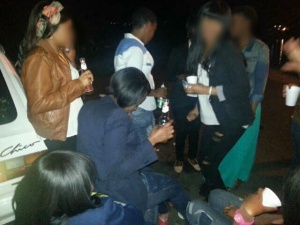By Sanele James
Traditional leaders and villagers at Mdeni, near Qumbu, have questioned a Pakistan family performing a Xhosa custom called Intonjane for their 21-year-old daughter Slahom Ikbal.
Intonjane is a custom which seeks to teach a girl about the proper and important aspects of womanhood, preparing her for a life of marriage and the responsibilities and rights of being a wife, a mother and a leader. The Intonjane ceremony has three segments, umngeno (joining), umtshatiso wentonjane (slaughter of cow) and the final stage umgidi (welcoming home ceremony).
The Pakistan family shocked residents of a small village called Mdeni in Qumbu after they performed the ritual for their daughter.
The AmaHlubi tribe chief, Chief Jongisizwe Ludidi strongly condemned such incidents saying the government should intervene.
“These people don’t know the basics of these customs. Sometimes they don’t follow the necessary procedures and that’s one of the reasons you find complications in other customs like circumcision,” he said.
After the ritual was performed, the headman of the Mdeni community, Mr Malizo Nkohla, quickly called a community meeting to question the issue as the Mdeni community members were fuming. Some claimed that what the Pakistani family did is an insult to the Xhosa tribe. The Ikbal family was also invited to the meeting.
In the meeting the Ikbal family was strongly condemned by the headman of the village as he said the custom wasn’t performed properly and it is an insult to the Xhosa nation as a whole.
The father of Slahom Ikbal, Shanez Ikbal said: “I don’t see anything wrong in celebrating my daughter’s 21st birthday this way. To me a person is not from where they are born but rather where they grow up because that is the place that forms their identity. And I have stayed here in South Africa for eight years.”
With the advent of globalisation in the form of social networks, internet and television the world has become smaller and people are embracing each other’s cultures.
The incident in Qumbu is not an isolated one. During the winter holidays, known to be the season for initiation schools, two Nigerian boys were taken to an illegal initiation school by unknown men in a village called Dangwane near Mount Frere.
Mandla Goba, a concerned resident said: “To me seeing foreign people embracing our customs is not a bad thing at all; it proves that they want to be part and parcel of the community and we should expect much more of these occurrences.” – WSU-SNA
